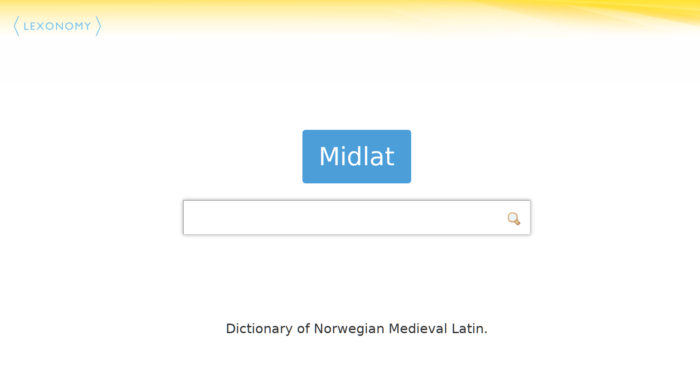Dictionary
Browse a pre-release of the dictionary
Browse a pre-release of the dictionary.
Articles covering the letters F, G, H, M, N, O, and Z are published in a pre-release. Click here to browse the dictionary.

The dictionary is published using the integrated production and publication platform Lexonomy. Lexonomy is open-source software and part of the ELEXIS project.
About the dictionary
Unlike earlier generations of lexicographers, who had to excerpt their corpora by hand, we are fortunate enough to have the help of modern technology with automated reading and excerption. Nevertheless, compiling a dictionary is an extremely time-consuming task, as it necessarily involves close study of every occurrence of each word in the corpus which will form the basis of the dictionary.
The compilation of the dictionary has two stages. First, we include only words that are not found in classical Latin (that is, which are later than c. 200 A.D.) and are therefore missing from many standard Latin dictionaries. To implement this, we have begun by eliminating most of the words included in the authoritative Oxford Latin Dictionary (OLD), which is strictly limited to classical Latin. We do, however, appreciate that most dictionaries of classical Latin are considerably less thorough than the OLD, and we have therefore decided to include rare words with no more than two quotations under their OLD entries, as those words may be expected to be missing from many other dictionaries.
The resulting list of non-classical words will then be the basis of the actual lexicographical work: going through every instance of all words, one by one, grouping them according to their exact meaning, identifying a logical and coherent order of definitions and/or subdefinitions in those cases where a word has several different meanings, and finally finding the most illustrative examples for inclusion in the dictionary.
Secondly, we will include those words, which, while found in classical Latin, acquired new meanings in the post-classical era. In doing so, we will have to go back to the classical words we omitted at the first stage, and checking each of those carefully, noting any non-classical meanings, which will then be included in the dictionary.
Work on the dictionary is in progress, and some further revision is needed of completed articles. Still, we plan to make the finished articles accessible on this page. Feedback and suggestions for improvement are welcome.